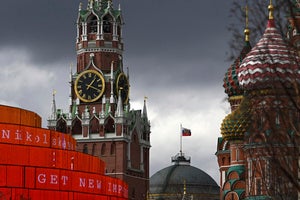At the same time, a plurality feel they are entitled to more.
In a contentious meeting on February 28, US President Donald Trump and Vice President JD Vance publicly berated Ukrainian President Volodymyr Zelenskyy, opening a rift between the administration and the embattled leader. Russian officials have since used the heated exchange to portray a pro-Russian shift in the United States’ position and policy on the conflict.
Polling dating back to 1999 shows that Russian public opinion tends to rally behind Moscow’s military interventions before dropping off after several years. Whether the conflict with Ukraine results in a positive or negative outcome for Russia, it is Russian President Vladimir Putin whom the people will hold responsible.
Russians More Grateful, Less Likely to Make Demands of Their Government than Years Ago
Even before the Trump-Zelenskyy spat, the Russian government was already riding high in public opinion. A Chicago Council on Global Affairs-Levada Center survey, fielded January 23-29, 2025, finds Russian attitudes toward their government are much more conciliatory than they have been since before the conflict in Ukraine. In addition, a more recent February 20-26 Levada Center survey, fielded just days before the Oval Office rift, showed Putin’s approval rating rising to 88 percent, the latest in a string of record highs since the special military operation began in February 2022.
Given the public’s confidence in Putin and government institutions, the data show that Russians are now more prepared to bear sacrifices and less inclined to make demands on their government than in the past.
In January, Russian citizens were asked about their views toward mutual obligations between themselves and their government. Though sizeable numbers think the Russian government should do more for its people (49%), overall levels of gratitude toward the state have risen since the last time similar questions were asked in 2018.
A plurality of Russians (35%) feels their government gives them a lot but that citizens could ask for more, the highest rate on record since polling began in 1989 (11%). Furthermore, just 14 percent believe the government has given them everything, and that no one has the right to demand anything more. The figure for this is also the highest on record, having bottomed out at 1 percent between 1999 and 2006. Mirroring these increases, those willing to make some sacrifices for their government nearly doubled between 2018 (8%) and 2025 (15%) (see appendix table 1). In addition, the data show Russian citizens now prioritize their country’s great-power status (55%) over improved living conditions (41%) for the first time in over two decades.
Fewer than two in 10 (15%) say the government gives them so little that citizens have no obligations toward it, the lowest in the post-Soviet era. Between 1999 and 2012, subscribers to this cynical view stayed consistently above 30 percent, peaking at almost four in 10 people in 2006 (39%).
Given the above, it’s not surprising that only 14 percent of Russians advocate for forcing the government to serve their interests, compared to 24 percent in 2018 and a whopping 37 percent in 1999.
A similar pattern of change in domestic views on state-society relations occurred in the wake of the “reunification of Crimea.” In 2015, the sentiment that the government has given citizens a lot and the willingness to bear some sacrifices increased from 2013 (from 29 to 36%, and 9 to 16% respectively). Those demanding the government serve popular interests more than halved from 23 percent to 10 percent, while those declining any obligation toward their government dropped from 29 to 22 percent in that period.
Putin’s Approval Riding High, Even Before Trump’s Oval Office Firestorm
Conciliatory attitudes are also reflected in views toward Putin. A February 20-26 poll fielded by the Levada Center shows that 88 percent of Russians approve of Putin’s actions as president. This is consistent with figures recorded in January.
This marks two straight months in which the Russian public expresses close to all-time high approval ratings of the president (since 1999, the year Putin became prime minister and then acting president upon Boris Yeltsin’s resignation). His approval has been inching upward in the years since 2022, when it spiked to 82 percent from just 65 percent in 2021.
The past quarter-century of Levada Center polling shows rises in wartime support for Putin followed by decline after the dust settles, an example of what political scientists call the “rally- ‘round-the-flag” effect. Most recently, his approval jumped from 64 percent to 82 percent after Crimea joined the Russian Federation in 2014, then held steady for four years before dropping.
Two earlier episodes also shifted opinion in Putin’s favor. Following a string of apartment bombings in 1999, Putin swiftly occupied the breakaway territory of Chechnya as acting president. The invasion, credited with helping him win the presidential election in 2000, evolved into a grinding insurgency that dragged on for nearly a decade. Putin’s approval saw another bump around the 2008 Russo-Georgian War, which ended with South Ossetia and Abkhazia seceding from Georgia with Russian backing.
Russians do not only offer praise for Putin. Approval of Prime Minister Mikhail Mishustin has also reached a recent high (75%) compared to just 54 percent in December 2021. Roughly the same can be said of the government as a whole (74% in February 2025 vs. 49% in December 2021).
All Eyes Are on Putin
The outcome of the conflict in Ukraine is critical for public perceptions of Putin in particular. Whether or not everyday Russians are aware that the Russian constitution grants foreign policymaking authority to the president, they describe Putin in the January Chicago Council-Levada Center survey as having the greatest source of influence on Russia’s foreign policy, followed by the Ministries of Defense and Foreign Affairs, and business leaders.
In the public eye, the State Duma (the equivalent of the House of Representatives), regional governors, and the views of the public are less influential. Finally, Russians overwhelmingly feel that public opinion has the least influence on foreign policy.
Conclusion
Taken together, the data suggest that the Russian public is likely to praise its government and leader if they manage to reach a settlement perceived as advantageous toward Moscow (or if they are persuaded that this is so). Even before the highly visible schism between Trump and Zelenskyy, Russians expressed more gratitude toward and a greater willingness to bear sacrifices for their government than in 2018, when dissatisfaction reigned.
This is not new. Over the last quarter-century, the Russian public has rallied behind the Kremlin in times of conflict. That historic pattern, however, also shows enthusiasm waning after several years. Whether, when, and how the drop repeats itself depends on public perception of Russia’s position. Whatever the eventual consequences of Moscow’s gamble with Ukraine, citizens will give Putin the credit—or the blame.
Appendix Table 1. State-Society Relations
Which of the following opinions about relations with the state would you be most likely to agree with? (%)
| Year | Our government has given us everything, no one has the right to demand anything more from it | The government gives us a lot, but citizens could ask for more | The government gives us so little that we are not obligated to do anything for it | Our government is currently in a position where we must help it, even if it requires some sacrifices | We must force the government to serve our interests | It is difficult to say |
|---|---|---|---|---|---|---|
| 1989 | 5 | 11 | 8 | 37 | 25 | 15 |
| 1999 | 1 | 6 | 38 | 17 | 37 | 2 |
| 2002 | 1 | 19 | 30 | 13 | 31 | 7 |
| 2006 | 1 | 15 | 39 | 9 | 27 | 9 |
| 2010 | 3 | 22 | 31 | 7 | 24 | 13 |
| 2011 | 4 | 23 | 31 | 5 | 26 | 10 |
| 2012 | 3 | 23 | 31 | 5 | 30 | 9 |
| 2013 | 3 | 26 | 29 | 9 | 23 | 10 |
| 2015 | 8 | 28 | 22 | 16 | 13 | 13 |
| 2016 | 3 | 25 | 27 | 17 | 9 | 9 |
| 2017 | 4 | 31 | 31 | 11 | 19 | 5 |
| 2018 | 5 | 26 | 29 | 8 | 24 | 8 |
| 2025 | 14 | 35 | 15 | 15 | 14 | 7 |
These Chicago Council-Levada Center surveys were conducted January 23-29, 2025, and February 20-26, 2025, among representative samples of all Russian urban and rural residents. The samples consisted of 1,615 Russians aged 18 or older from the 137 municipalities within the 50 regions of the Russian Federation. Researchers from the Levada Center conducted personal interviews in respondents’ homes.
The distribution of responses is given as a percentage of the total number. The data set is weighed by gender, age, level of education for each type of settlement (large cities, medium cities, small towns, villages) within each Federal district independently, in accordance with Rosstat data. The statistical error of these studies for a sample of 1600 people (with a probability of 0.95) does not exceed: 3.4 percent for indicators around 50 percent, 2.9 percent for indicators around 25 percent/75 percent, 2.0 percent for indicators around 10 percent/90 percent, and 1.5 percent for indicators around 5 percent/95 percent.






Related Content
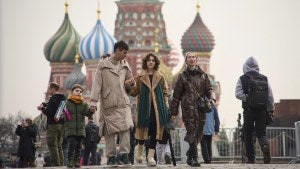 Public Opinion
Public Opinion
While the public thinks Putin’s foreign policies have improved Moscow’s international influence and the state of the Russian military, fewer now say they have boosted their country’s image abroad.
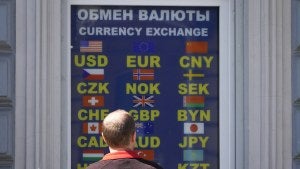 Public Opinion
Public Opinion
Most believe Russia should continue to pursue an independent foreign policy despite the sanctions, which are attributed to the West’s hostility and misunderstanding of the situation in Ukraine.
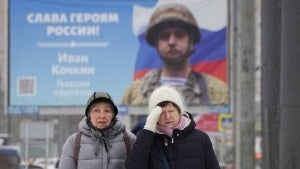 Public Opinion
Public Opinion
But the public is more ready than ever to enter peace negotiations.
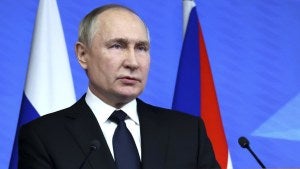 Public Opinion
Public Opinion
The public shares the Kremlin's dim view of Western powers and wants to boost cooperation with BRICS members.
